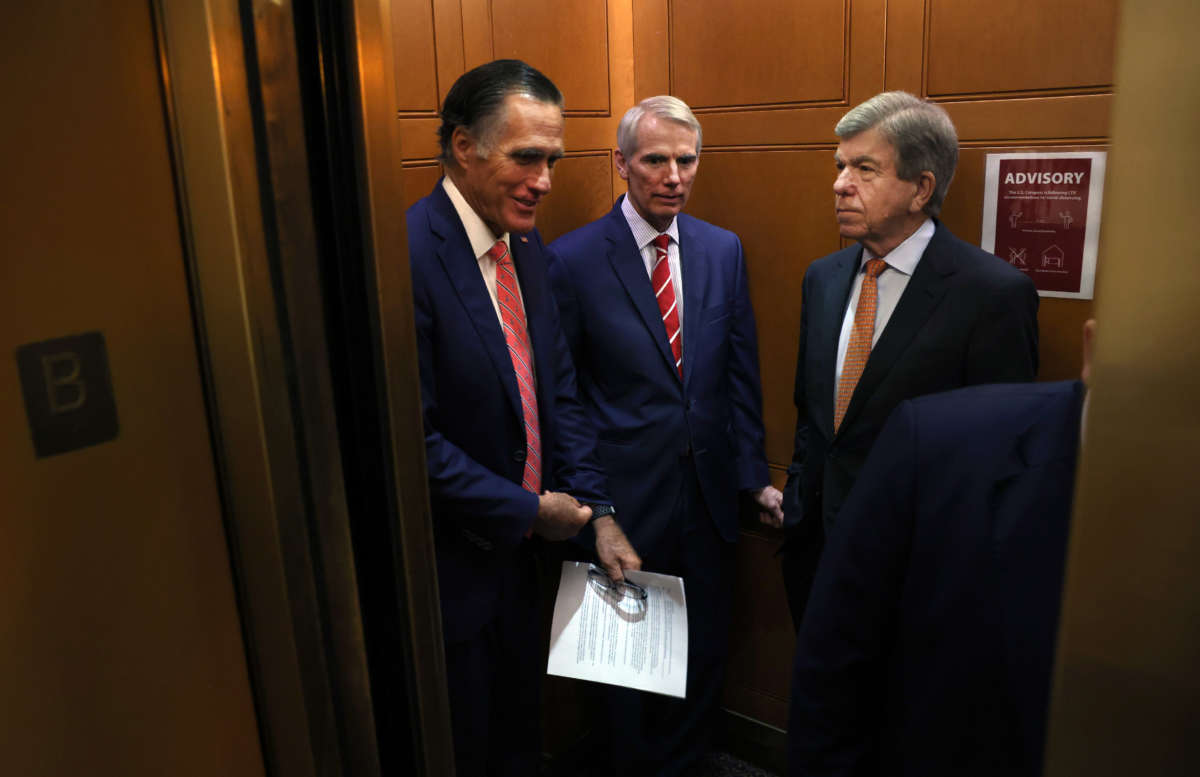Did you know that Truthout is a nonprofit and independently funded by readers like you? If you value what we do, please support our work with a donation.
Facing pressure from conservative groups and their wealthy donors, Republicans in the bipartisan group of centrists negotiating the infrastructure bill have dropped a provision to increase tax enforcement on wealthy people from the latest draft of the package.
Joe Biden has proposed giving the IRS an additional $80 billion in funding to crack down on wealthy and corporate tax cheats, which would raise an estimated $700 billion over 10 years. A previous draft of the bipartisan centrists’ infrastructure bill also included a proposal similar to Biden’s to empower the Internal Revenue Service (IRS) to increase tax enforcement on the wealthy.
But that proposal was much smaller than Biden’s, and reportedly would have raised only $100 billion over a decade to help pay for the already meager infrastructure bill that’s currently on the table.
Sen. Rob Portman (R-Ohio) told CNBC that Republicans pushed back against the proposal after they learned that Democrats may be including a more comprehensive version of the IRS expansion in their reconciliation bill, which they plan to pass with a simple majority in the Senate.
“That created quite a problem,” said Portman, who said Republicans believed that the much smaller IRS proposal in the bipartisan bill would be the only IRS funding in this round of legislation. Now, with Republicans standing against the reconciliation bill, too, it appears the party is standing against all extra IRS funding.
Previous reporting found that GOP resistance to the IRS funding may have come not only from political maneuvering but also from a genuine opposition to the Democrats’ proposal of giving the agency more power to go after wealthy tax cheats.
“I think there needs to be constraints on what the use of those IRS agents would be. So we’re taking a look at that. That pay-for has some red flags among Republicans,” said Sen. Jerry Moran (R-Kansas) last week.
When CNN asked if Sen. Mike Rounds (R-South Dakota) would support the IRS pay-for, he said “No. No, no, no. I’m not committed or totally guaranteed on it .… I want to support it, but I’m going to wait and see the final product as well, but I’m hoping that it works.”
Though none of the Republicans have come out and expressed their opposition to the IRS proposal in explicit terms, it’s not at all surprising that they would be opposed to increasing tax enforcement on the rich.
Headline: Republicans will only vote for an infrastructure package that makes it easy for corporations and the wealthy elite to avoid taxes. https://t.co/TVo5MyWlDs
— Jamaal Bowman (@JamaalBowmanNY) July 18, 2021
Earlier drafts of Biden’s infrastructure proposal included provisions to pay for the bill with relatively moderate tax hikes on corporations and the rich, slightly undoing Republicans’ 2017 tax cuts for the same groups. GOP legislators came out against that proposal very early in the infrastructure negotiations process.
It follows, then, that they would also be interested in protecting wealthy peoples’ ability to dodge taxes. A recent bombshell report from ProPublica found that, thanks partially to the 2017 tax cuts and existing tax loopholes, many of the wealthiest Americans on earth pay extremely low federal income tax rates.
Republicans have also helped to shrink the IRS over the years. Chipping away at the IRS’s budget has weakened the agency’s ability to go after rich tax cheats, who often have methods to hide their money that are too sophisticated and complicated for the IRS to spend time unraveling. Instead, the IRS disproportionately goes after low-income people because they’re cheaper to audit.
Corporations, too, have benefited from cuts to the IRS. A recent report by The Washington Post found that federal audits of corporations have decreased drastically in recent years because Republicans have slashed the agency’s budget.
Right wing groups, meanwhile, have been mobilizing against the proposed IRS funding, telling Republican leaders like Sen. Mitch McConnell (R-Kentucky) to oppose any increases to IRS funding. Many of the groups pushing against the funding, as The Washington Post pointed out, are funded by the very people who would likely be affected by increased IRS enforcement.
“As a result, the federal government now examines just half of all large company tax returns, despite businesses claiming increasing tax benefits over this period that they say could be overturned by authorities,” wrote The Washington Post.
Indeed, opposing extra IRS funding appears to be at the behest of corporations and the wealthy, who have been opposed to recent tax raise proposals and would likely also be affected by increased IRS enforcement.
Press freedom is under attack
As Trump cracks down on political speech, independent media is increasingly necessary.
Truthout produces reporting you won’t see in the mainstream: journalism from the frontlines of global conflict, interviews with grassroots movement leaders, high-quality legal analysis and more.
Our work is possible thanks to reader support. Help Truthout catalyze change and social justice — make a tax-deductible monthly or one-time donation today.
